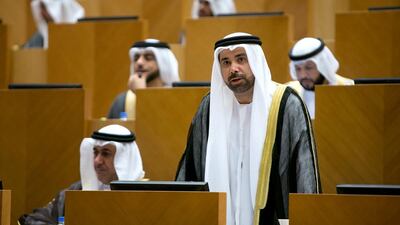ABU DHABI // People forced against their will into committing or planning acts of terrorism could be sent to new guidance centres instead of being jailed under legislation approved by the Federal National Council this week.
FNC members gave the go-ahead for the creation of the new centres where counsellors will engage with people who are at risk of carrying out terrorism as part of the UAE’s new antiterrorism law.
Article 41 of the law states: “If a person is found to be terrorism prone, they are referred to one of the guidance centres based on a court ruling and a request by public prosecution.”
The centres are intended to help the authorities to rehabilitate people exposed to extremism back into society.
“Those caught on first or even second instances involved in terrorism-related acts because they were mislead or pushed by others, or were under certain circumstances and yet appear to be capable to get back to the right path are among those who can be sent to these centres” said Ali Al Nuaimi, FNC member for Ajman.
A report will be presented to the public prosecution by the centre every three months on the status of the person. The prosecution will then raise the report with the court, which will rule if the person is ready to be released.
“If there is hope that this person will become a good citizen, at the guidance centre there are counsellors who could enhance his behaviour and lead him to the right path,” said Mr Al Nuaimi,
“It is a training course like a school. This shows that the main purpose of this law is not to issue verdicts and punishments. We want individuals who will serve their societies and be of benefit to the state.
“Such an initiative is very positive and shows that it was based on directions from the wise leadership. They do not want to lose individuals who were tricked into adopting such thoughts.”
The Cabinet will issue a list of amendments regarding the centres to outline details including when, who and what type of cases could be referred to them and their operating methods.
Mr Al Nuaimi said the existence of such a law would make people think twice before interfering or committing any act that was related to terrorism.
While most nationals in the UAE had a high level of loyalty, he said that the country needed to consider recent circumstances worldwide and in the region. “There are fears that such matters are transferred [here] through those who are envious of the accomplishments that the UAE has achieved.”
The law was announced during the council’s discussion about amendments that were set by the law and legislation committee ahead of Monday’s session.
These included reducing some punishments, such as in article 12 that states those who attack or attempt to attack figures under international protection or their workplace, residence or motorcade, should face death or life in prison. This was changed to either a life sentence or a jail term. The reason for the change was so that the punishment could be in accordance with the nature of the crime.
Changes were also made to article 29 section 1, which states whoever is involved in a criminal agreement is issued a sentence between 10 and 25 years. The 25-year term option was reduced to 20 as it was unusual to specify a sentence that was longer than 20 years.
The duration of detention for investigation purposes by public prosecution was also decreased from six to three months, unless a court is notified of the extension in order to maintain the rights of detainees.
Other changes were made to article 13 to increase the punishment to death or a life sentence against whoever holds hostage a female, juvenile, or a mentally disabled person.
hdajani@thenational.ae


